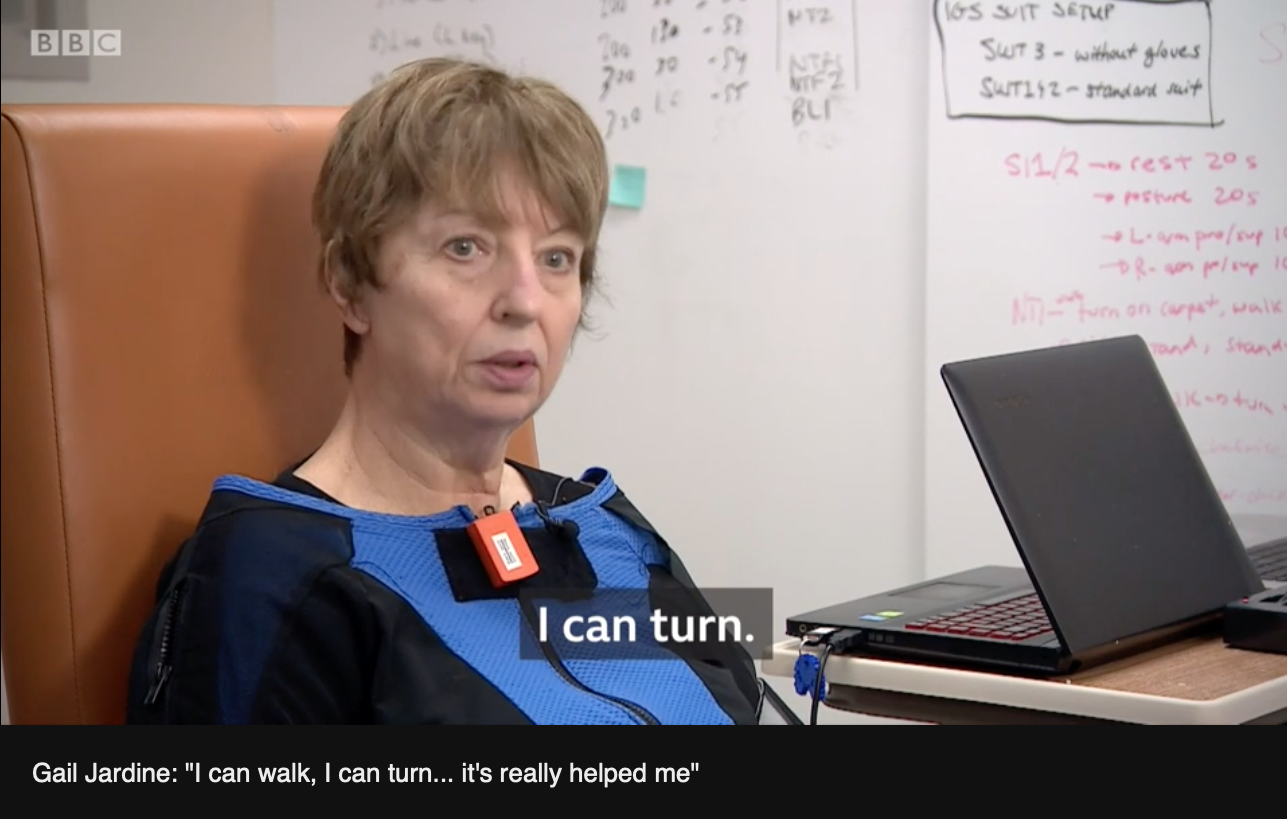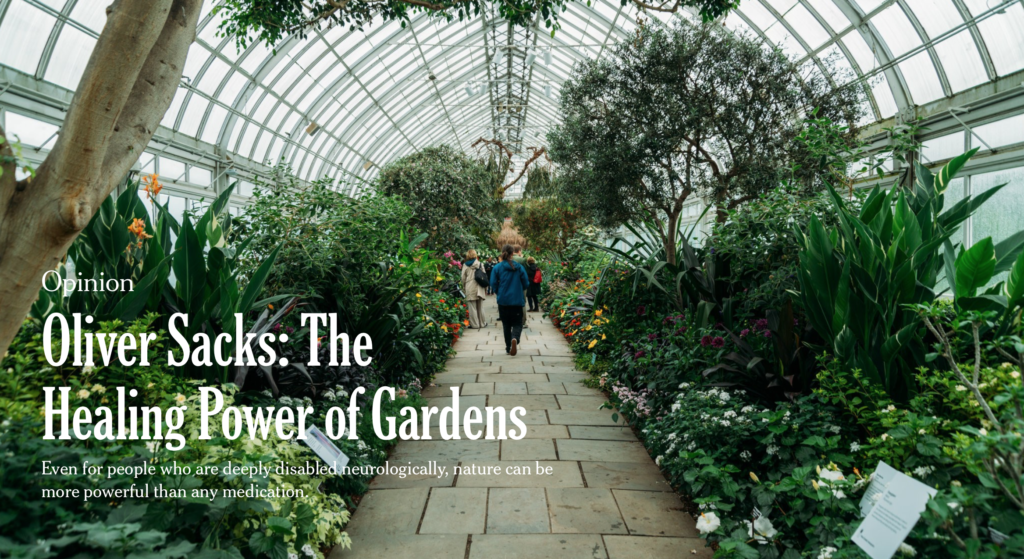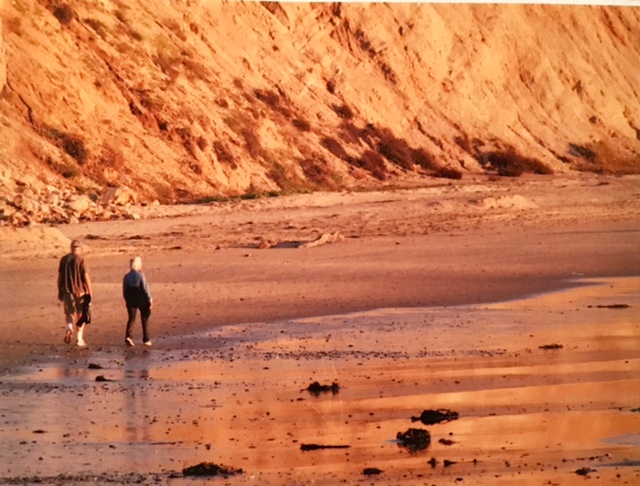“What greater thing is there for human souls than to feel that they are joined for life – to be with each other in silent unspeakable memories.” – George Eliot
2019
JUNE 8 Youths! Go Listen to Your Elders! A little neighborly conversation can go a long, long way.
APRIL 22 Parkinson’s Results beyond Researchers’ Wildest Dreams
A treatment that has restored the movement of patients with chronic Parkinson’s disease has been developed by Canadian researchers.
Previously housebound patients are now able to walk more freely as a result of electrical stimulation to their spines.
A quarter of patients have difficulty walking as the disease wears on, often freezing on the spot and falling.
Parkinson’s UK hailed its potential impact on an aspect of the disease where there is currently no treatment.
Prof Mandar Jog, of Western University and associate scientific director, Lawson Health Research Institute in London, Ontario, told BBC News the scale of benefit to patients of his new treatment was “beyond his wildest dreams.” More.
APRIL 18 The Healing Power of Gardens
This is an excerpt from “Everything in Its Place,” a posthumous collection of writings by Dr. Sacks.
As a writer, I find gardens essential to the creative process; as a physician, I take my patients to gardens whenever possible. All of us have had the experience of wandering through a lush garden or a timeless desert, walking by a river or an ocean, or climbing a mountain and finding ourselves simultaneously calmed and reinvigorated, engaged in mind, refreshed in body and spirit. The importance of these physiological states on individual and community health is fundamental and wide-ranging. In 40 years of medical practice, I have found only two types of non-pharmaceutical “therapy” to be vitally important for patients with chronic neurological diseases: music and gardens. More.
MARCH 23 Human Contact Is Now a Luxury Good
MARCH 16 ‘Dementia is the plague of our time, the disease of the century’
In an extract from her new book, the Observer journalist remembers her father’s dementia and death, and reflects on the disease’s impact on society
MARCH 13 How Japan is helping pensioners stay happy and have fun
MARCH 3 Does our immune system hold the key to beating Alzheimer’s disease?
“Incurable and increasingly prevalent, Alzheimer’s has long puzzled the research community. Now scientists believe the human body may be the best line of defence.”
FEBRUARY 8 What ‘Anna Karenina’ taught me about living with depression.
“A good novel can be a reminder that other people have endured tragedies, long ordeals, bad odds.”
JANUARY 19 How Exercise May Help Keep Our Memory Sharp
“Irisin, a hormone that is released during exercise, may improve brain health and lessen the damage that occurs during Alzheimer’s disease.”
2018
NOVEMBER 25 Alzheimer’s ‘vaccine’ could cut dementia cases in half, researcher says
“Researchers at the University of Texas Southwestern have developed an Alzheimer’s vaccine that has shown promise in mice, monkeys and rabbits.”
OCTOBER 22 Want to Keep your Brain sharp? Take Care of your Eyes and Ears.
“By age 40, about 1 in 10 adults will experience some hearing loss. It happens so slowly and gradually, says audiologist Dina Rollins. “You don’t realize what you’re missing.” And even as it worsens, many people are in denial.”
OCTOBER 13 Every Older Patient Has a Story to Tell
“At more than 20 medical schools in the United States, students are getting an earful — about life, about perspective — from healthy seniors.”
OCTOBER 9 The Importance of Medical Touch
“It can show gentleness and compassion or carelessness and incompetence.”
SEPTEMBER 12 Robo-trousers to give elderly bionic strength
“Robo-trousers which help people stand up, walk upstairs and get out-and-about without wheelchairs, are being designed by British scientists in a government-funded scheme to help the elderly and disabled stay mobile.”
SEPTEMBER 10 In Life’s Last Moments, Open a Window
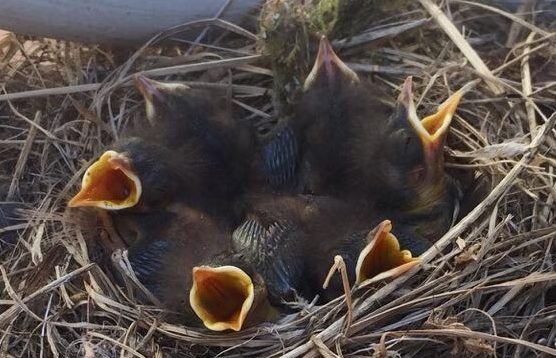
“My hospice patients were dying, but they still longed for fresh air and birdsong.”
SEPTEMBER 8 “I had Alzheimer’s. But I wasn’t ready to retire.”
““How long have you got?”
This is what my boss asked me when I informed him, in July 2014, that I had early-onset Alzheimer’s.”
AUGUST 28 Is Owning a Dog Good for your Health?
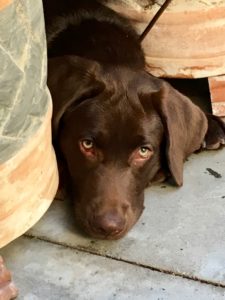
Baby Finn.
“A new study suggests canine-lovers could be 23% less likely to die from heart disease – or it could just be that healthier people prefer dogs.”
JULY 28 Exercise Makes the Aging Heart More Youthful
“For lifelong heart health, start exercising early in life and keep exercising often. But even if you have neglected to exercise and are now middle-aged, it is not too late.”
MAY 15 Gels, Foams and Purees: Cookbooks serve up recipes for those who struggle to swallow
“Swallowing disorders are becoming more common. Some chefs are now whipping up nutritious recipes that are not only easy on the throat, but help restore the joy of eating. Left: Pureed satay chicken with edamame, shaped into the form of a drumstick. Right: Pureed fruit and yogurt set with agar agar â Australian chef Peter Morgan-Jones calls it an ideal finger food for those with dysphagia.”
MAY 14 Drug target for curing the common cold
“UK scientists believe they may have found a way to combat the common cold. Rather than attacking the virus itself, which comes in hundreds of versions, the treatment targets the human host. It blocks a key protein in the body’s cells that cold viruses normally hijack to self-replicate and spread.”
APRIL 6 Finding Meaning and Happiness in Old Age

“What’s the best way to develop a healthy perspective on old age? Spend more time with elderly people and discover what brings meaning and pleasure to their twilight years despite the losses, both physical and social, they may have suffered.”
MARCH 30 For many strokes, there’s an effective treatment
“For years, doctors had tried — and failed — to find a treatment that would preserve the brains of stroke patients. The task was beginning to seem hopeless: Once a clot blocked a blood vessel supplying the brain, its cells quickly began to die. Patients and their families could only pray that the damage would not be too extensive.”
MARCH 25 Meet the man living with Alzheimer’s who climbs the same mountain every day.
“Sion Jair, 68, has climbed the Old Man of Coniston at least 5,000 times and the emerging science backs him up that regular, vigorous exercise is beneficial for those with the disease.”
MARCH 22 For Heart Disease, Think Exercise, Not Weight Loss
“For people with coronary heart disease, losing weight will not prolong life, a new study reports, but increasing physical activity will.”
MARCH 14 Dementia Study Links Your Risk With Your Fitness Level
“Your stamina — or the time it takes for you to reach peak exhaustion during exercise — can be tied to your dementia risk, and a new study reveals how.”
MARCH 8 Sorry, Adults, No New Neurons for Your Aging Brains
“A major study is challenging the widely held view that adult human brains make new neurons.”
JANUARY 18 British Government Targets A Modern Public Health Scourge: Loneliness
“The country that put the starch in “stiff upper lip” has made companionship, conversation and human contact a national priority.”
JANUARY 8 A Memory Shortcut, With a Little Help from Friends
“Humans formed social networks long before social media, so why not put them to use?”
JANUARY 5 You’re Over 75, and You’re Healthy. Why are You Taking a Statin?
“Should a 76-year-old who doesn’t have heart disease, but does have certain risk factors for developing it, take a statin to ward off heart attacks or strokes?”
2017
DECEMBER 31 Achieving Your Personal Health Goals
“Many of us make New Year’s resolutions. Few of us realize them. Maybe it would help to reframe how we handle our resolutions by thinking of them as goals instead.”
DECEMBER 30 Immortality at Midnight
“Toward the end of another unexpected year of existence, outliving a poor prognosis of late-stage cancer rouses me in the dark. Such an awakening is quite different from the fretful insomnia that accompanied the dire diagnosis. Especially in this season of celebrated miracles, it somehow thrills me to be stirring at 2 or 3 a.m. Trepidation and grief dissolve in the weird awareness (can it possibly be true?) of still being alive.”
DECEMBER 18 Are You Old? Infirm? Then Kindly Disappear
“Nancy Root remembers when she vanished. Not the exact date, but the occasion: She went shopping for a mattress. This was a few years ago. Because the mall was so big and her legs were so weak, she used a wheelchair, which was new to her, and had a friend push her.”
NOVEMBER 13 No Excuses, People: Get the New Shingles Vaccine
“Medical researchers and government health policymakers, a cautious lot, normally take pains to keep expectations modest when they’re discussing some new finding or treatment.”
NOVEMBER 7 Brains Sweep Themselves Clean of Toxins During Sleep
“While the brain sleeps, it clears out harmful toxins, a process that may reduce the risk of Alzheimer’s, researchers say.”
OCTOBER 28 One Last Question Before the Operation: Just how Frail are you?
“Earlier this month, Dr. Thomas Robinson, a general surgeon at the Denver Veterans Affairs Medical Center, saw a patient in his mid 80s. The man had gallstones that caused infections, with abdominal pain severe enough to send him to an emergency room every couple of months.”
OCTOBER 10 Close your eyes to listen-you might understand more
“When it comes to understanding how another person thinks and feels, it might be best to close your eyes and listen.”
SEPTEMBER 22 One last visit to see my Patient
“The rain was coming down in torrents and my shoes were not up to the job. Nevertheless, I pressed forward along the soggy blocks. My 91-year-old patient and I had been together for some 20 years — honestly I’d lost count — so this was the least I could do.”
AUGUST 13 “Words are the best weapon with which to come to terms with ageing.”
“Words are still the best weapons with which to come to terms with ageing, and what Beckett calls “failing better”…Turn a page, and you find a new distraction, or another version of reality. Is this not the search for a fuller kind of experience? Art, which helps us focus on our quality of life, also inspires a richer understanding of our mortal existence.”.
AUGUST 11 As I Get Older, Why does my Memory for Names seem to Deteriorate?
“Forgetting someone’s name is a common misstep. The structure of memory explains why you can often recognize the person’s face and even come up with other details, such as where and how you met, but the name remains elusive.”
AUGUST 7 Caregiving is Hard Enough.Isolation can make it Unbearable.
“For years, Marcy Sherman-Lewis went to a beauty salon in St. Joseph, Mo., every few weeks for a haircut and highlights. It had become something of an ordeal to prepare her husband, Gene Lewis, for this outing; he has Alzheimer’s disease, at 79, and helping him shower and dress, insert hearing aids and climb into the car was a very slow process. But she could no longer leave him at home alone.”
JUNE 30 What to Blame for your Stomach Bug? Not Always the last Thing you ate
“It happens like a bolt out of the blue. One minute you’re fine, and the next you begin to sweat as crippling cramps move wavelike through your belly. You vomit or have diarrhea, or both, fearing you won’t live to see another day.”
JUNE 22 Back Pain? Try Yoga
“Yoga works as well as physical therapy for relieving back pain, a randomized trial found.”
JUNE 21 In “Memory’s Last Breath” An Academic Confronts Demetia
“She kept getting confused, losing her place in lessons at the University of Utah, where she taught. And then, just before she turned 61, Gerda Saunders was given a diagnosis: She has early-onset microvascular dementia.”
JUNE 20 The Symptoms of Dying
“Dying has its own biology and symptoms. It’s a diagnosis in itself. While the weeks and days leading up to death can vary from person to person, the hours before death are similar across the vast majority of human afflictions.”
JUNE 9 Better Health Through the ‘Lassie Effect’.

Maverick, just a few months after he found his “forever home” with Aonghais and Megan in Sydney in 2017.
“Researchers commonly use the term the “Lassie effect” to describe the wide-ranging health benefits of walking a dog. The name refers to the television collie that nobly saved Timmy’s and so many other people’s lives week after week on her popular show.”
MAY 24 A 1-Hour Walk, 3 Times a Week, has Benefits for Dementia
“Exercise may bolster the brain function and thinking skills of people with dementia, according to a new report. The study’s findings suggest that walking a few times per week might alter the trajectory of the disease and improve the physical well-being of people who develop a common form of age-related memory loss that otherwise has few treatments.”
MAY 21 Planning to Age in Place? Find a Contractor now.
“All the carpets are coming up, so they won’t be a trip hazard,” said Ernie MacNeill, walking through the split-level house in Fair Lawn, N.J., that he is remodeling for a client who struggles to walk.”
APRIL 3 Don’t Write Us Off: People with Dementia press for more Rights-and Respect
“Ten months ago, Peter Mittler stood before a global audience of Alzheimer’s disease researchers and advocates and decried the indignities that people with dementia undergo.”
APRIL 3 A Positive Outlook May Be Good For Your Health
““See the glass as half-full, not half-empty.” Researchers are finding that thoughts like these, the hallmarks of people sometimes called “cockeyed optimists,” can do far more than raise one’s spirits. They may actually improve health and extend life.”
MARCH 26 Telehealth Doctor Visits may be Handy, but aren’t Cheaper Overall
“Telehealth takes a lot of forms these days. Virtual visits with a health care provider can take place by video, phone or text, or via the Web or a mobile app. The one commonality: You get to consult a doctor from your home, the office, Starbucks or anywhere with a wifi or mobile connection.”
MARCH 17 Cholesterol-Slashing Drug Can Protect High-Risk Heart Patients, study says
“The first rigorous test of an expensive new drug that radically lowers cholesterol levels found that it significantly reduced the chance that a high-risk patient would have a heart attack or stroke. These were men and women who had exhausted all other options.”
MARCH 10 Want to feel magic? Ditch Netflix, dump the phone and get outside
“‘Get out now” are the first three words of Outside Lies Magic, a book published almost 20 years ago by the Harvard academic John Stilgoe, but that feels more necessary than ever, in these mean-minded days of Trump and Brexit and trolling and shrivelling attention spans.”
MARCH 8 The Secret of Why we like to eat Chocolate
“It may seem simple – we like chocolate because it tastes nice. But there’s more to it than that – and it relates to a fat/carbohydrates balance that is set right from the very beginning of our lives.”
MARCH 1 Adopt Kindness
“The story behind Anaheim’s City of Kindness initiative includes a six year old’s artwork, the Dalai Lama and Lady Gaga.”
FEBRUARY 4 Why Immortality is Overrated
“Helen was 82. She’d survived both breast cancer and outlived her husband. One summer day she began bleeding from her colon and was admitted to the hospital. We assumed the worst — another cancer. But after she endured a series of scans and being poked with scopes, we figured out that she had an abnormal jumble of blood vessels called an arteriovenous malformation in the wall of her colon.”
FEBRUARY 3 The Purpose of Sleep? To Forget, Scientists Say
“Over the years, scientists have come up with a lot of ideas about why we sleep.”
JANUARY 30 Get Up and Move. It May Make You Happier
“When people get up and move, even a little, they tend to be happier than when they are still, according to an interesting new study that used cellphone data to track activities and moods. In general, the researchers found, people who move are more content than people who sit.”
JANUARY 9 One Man’s Quest to Change the Way we Die
“How B.J. Miller, a doctor and triple amputee, used his own experience to pioneer a new model of palliative care at a small, quirky hospice in San Francisco.”
2016
NOVEMBER 29 What not to say to a Cancer patient
“What do you think is the most commonly asked question of a person who has, or has had, cancer? If you guessed, “How are you?” you got it right.”
NOVEMBER 10 Breathe, Exhale. Repeat: the Benefits of Controlled Breathing
“Take a deep breath, expanding your belly. Pause. Exhale slowly to the count of five. Repeat four times. Congratulations. You’ve just calmed your nervous system.”
NOVEMBER 8 Going to the Emergency Room without leaving the Living Room
“Paul Vitale assisted his mother, Maria Vitale, 88, with a hearing aid in her Elmont, Queens, home. Since March 2015, paramedics have visited 10 times, but taken her to the hospital just once.”
NOVEMBER 5 My Deathbed Playlist (and Yours)
“Now that I’m approaching my mid-40s, I’ve finally gotten around to some basic end-of-life planning. Health care proxy? Check. Power of attorney? Signed. My playlist for dying? It’s done.”
NOVEMBER 2 Alzheimer’s treatment within reach after successful drug trial
“Tablet that ‘switches off’ production of toxic amyloid proteins could be first treatment licensed in a decade if it is also shown to slow mental decline.”
SEPTEMBER 23 Denmark’s ‘House of Memories’ Re-Creates 1950’s for Alzheimer’s Patients
“The Old Town Museum in Aarhus, Denmark has created a “House of Memories” that’s an exact replica of a 1950s apartment. It’s intended for Alzheimer’s patients, whose memories may be triggered by the sights, sounds and smells from the period, researchers say.”
SEPTEMBER 23 Moments of Glory: What Alzheimer’s Couldn’t Steal
“The Giants went on to win the World Series that year, but that’s not why I remember the July 29 game. I remember that afternoon because my mom, in the throes of Alzheimer’s, left the house she shared with my dad in the Noe Valley neighborhood, walked four or so miles and somehow ended up at AT&T Park. Then she went inside and watched her team.”
AUGUST 31 Trial shows tantalising signs that new Alzheimer’s drug could benefit early-stage patients
“A trial of a new Alzheimer’s drug has shown it could benefit patients in the earliest stages of the disease, raising hopes that a treatment for the devastating condition may finally be on the horizon.”
AUGUST 4 Newport doctor who has overcome hearing loss is a finalist for national award
“William Shankle wore his first hearing aid when he was 17. He had been losing his hearing since age 7, when he always had to sit at the front of his classrooms in school so he could hear the teachers.”
AUGUST 4 Setting the Body’s ‘Serial Killers’ loose on Cancer
“After a long, intense pursuit, researchers are close to bringing to market a daring new treatment: cell therapy that turbocharges the immune system to fight cancer.”
JULY 29 To Boost Memory: Study, Wait, then Exercise
“Learning requires more than the acquisition of unfamiliar knowledge; that new information or know-how, if it’s to be more than ephemeral, must be consolidated and securely stored in long-term memory.”
JULY 20 Fashion’s Newest Frontier: the Disabled and the Displaced
“Six years ago, Maura Horton, a housewife in Raleigh, N.C., received a call from her husband, Don, the assistant football coach at North Carolina State. He was on the road for a game and having so much trouble buttoning his shirt, he had to ask a player (Russell Wilson, now the quarterback of the Seattle Seahawks) for help.”
JULY 9 A Medical Mystery of the Best Kind: Major Diseases are in Decline
“Something strange is going on in medicine. Major diseases, like colon cancer, dementia and heart disease, are waning in wealthy countries, and improved diagnosis and treatment cannot fully explain it.”
JUNE 30 Virtual Reality Aimed at the Elderly Finds New Fans
“Virginia Anderlini is 103 years old, and she is about to take her sixth trip into virtual reality. In real life, she is sitting on the sofa in the bay window of her San Francisco assisted-living facility. Next to her, Dr. Sonya Kim gently tugs the straps that anchor the headset over Anderlini’s eyes.”
JUNE 28 Does your body really refresh itself ever 7 years?
“The latest episode of the podcast Invisibilia explores the idea that personality — something a lot of us think of as immutable — can change over time.
That got Invisibilia co-host Lulu Miller wondering if anything about us stays the same. Do all the cells in our body turn over every seven years as is sometimes claimed, with new cells replacing old ones? Or is there something that we hang on to for life?”
JUNE 19 Poetry can heal-it helped me through depression
“In Dante’s time, books were sold in apothecary shops: literature as medicine. I learned this when I was very ill, during an acute episode of manic depression, and I was struck by the profound metaphor behind this commercial fact. The apothecary of literature can heal, and I would need it desperately.”
JUNE 1 Yoga May Be Good for the Brain
“A weekly routine of yoga and meditation may strengthen thinking skills and help to stave off aging-related mental decline, according to a new study of older adults with early signs of memory problems.”
MARCH 16 Meditation Plus Running as a Treatment for Depression
“Meditating before running could change the brain in ways that are more beneficial for mental health than practicing either of those activities alone, according to an interesting study of a new treatment program for people with depression.”
FEBRUARY 29 “The Secret Life of a Dementia Carer: I’ll never forget finding an iron in the fridge”
“The hours are ridiculous and the money’s dreadful – so why do I do it? Because there’s nothing more rewarding than helping someone to negotiate the world.”
FEBRUARY 17
“The pioneering project aims to enhance palliative care for the patients, but also to bring ideas and discussion about a difficult subject to a wider audience. Lauren Razavi considers the remodelling of mortality.”
FEBRUARY 14
“Access to hearing aids could help fight dementia”
“Physician Frank Lin says treating hearing loss could help fight cognitive decline as he estimates 36% of dementia risk linked to hearing impairment.”
FEBRUARY 2
“A New Vision for Dreams of the Dying”
“For thousands of years, the dreams and visions of the dying have captivated cultures, which imbued them with sacred import….In the modern medical world, such experiences have been noted bypsychologists, social workers and nurses. But doctors tend to give them a wide berth because “we don’t know what the hell they are,” said Dr. Timothy E. Quill.”
JANUARY 7
“When Dr. Paul Kalanithi sent his best friend an email in May 2013 revealing that he had terminal cancer, he wrote: “The good news is that I’ve already outlived two Brontës, Keats and Stephen Crane. The bad news is that I haven’t written anything.””
JANUARY 4 Lack of Deep Sleep May Set the Stage for Alzheimer’s
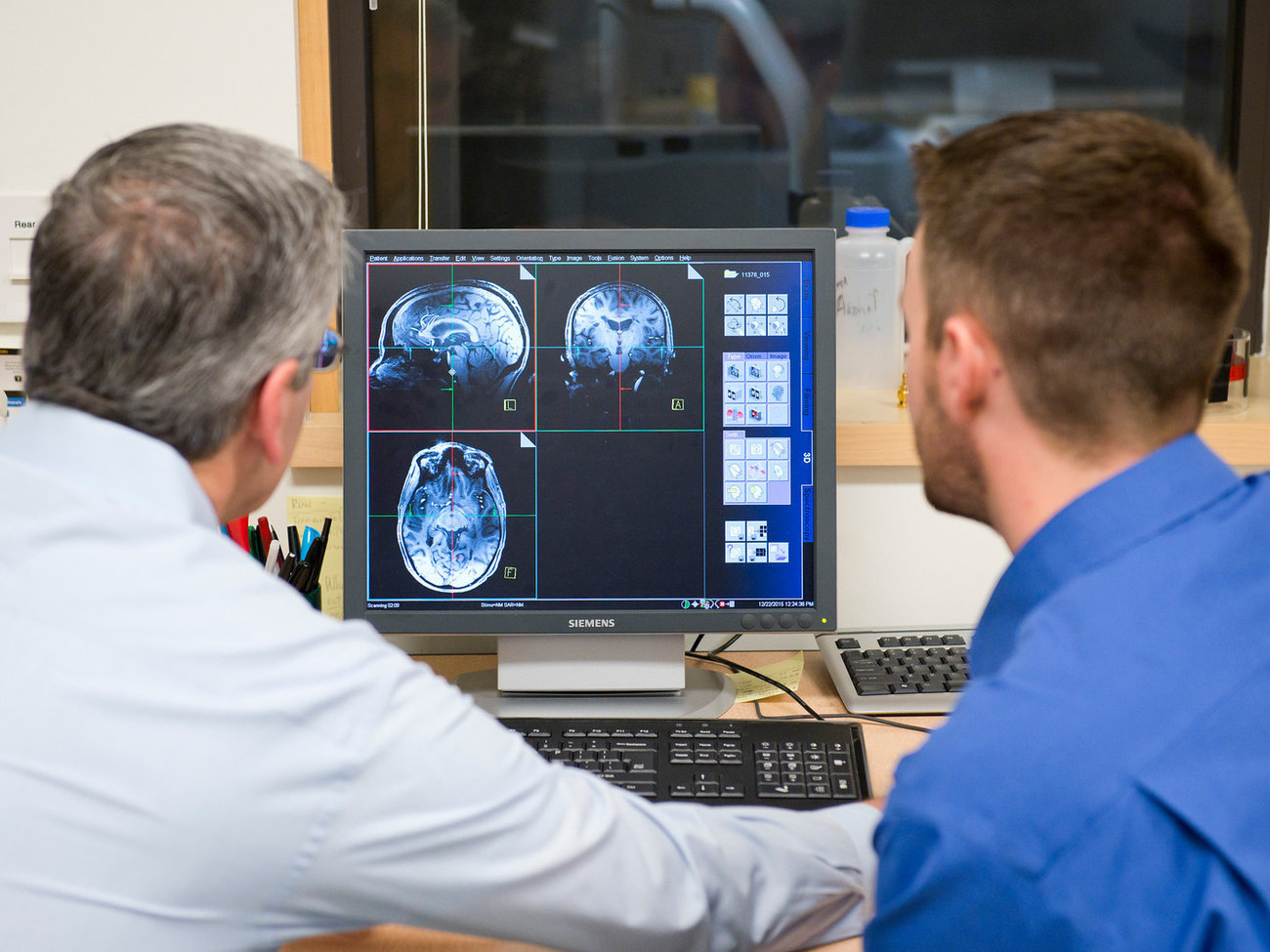
Jeffrey Iliff (right) and Bill Rooney, brain scientists at Oregon Health & Science University, look over an MRI. The school has an especially sensitive MRI unit that should be able to detect precisely when during sleep the brain is being cleansed of toxins. Courtesy of Oregon Health & Science University. Courtesy of NPR.
“There’s growing evidence that a lack of sleep can leave the brain vulnerable to Alzheimer’s disease.
“‘Changes in sleep habits may actually be setting the stage’ for dementia, says Jeffrey Iliff, a brain scientist at Oregon Health & Science University in Portland.
“The brain appears to clear out toxins linked to Alzheimer’s during sleep, Iliff explains. And, at least among research animals that don’t get enough solid shut-eye, those toxins can build up and damage the brain.”
2015
DECEMBER 5
As Aging Population Grows, so do Robotic Health Aids
“The ranks of older and frail adults are growing rapidly in the developed world, raising alarms about how society is going to help them take care of themselves in their own homes.”
NOVEMBER 28
A Hidden Scourge: Preying on the Elderly
“Mariana Cooper, 86,with her granddaughter, Amy Lecoq, 39. Ms. Cooper was bilked out of much of her savings by someone she considered a friend.”
NOVEMBER 18
“As I frequently have written in this column, exercise may cause robust improvements in brain health and slow age-related declines in memory and thinking. Study after study has shown correlations between physical activity, muscular health and mental acuity, even among people who are quite old.”
NOVEMBER 10
It’s never too soon to plan your ‘Driving Retirement’
“At 72, Robert McSherry says he’s not yet ready to quit driving or ready to plan how he’ll get around when that time arrives. But he’s happy to get the insurance discount that comes with taking a driver safety class.”
NOVEMBER 2
A ‘huge milestone”: approval of cancer-hunting virus signals new treatment era
“Imlygic programs viruses to attack only cancer cells and gives patients more humane options – potentially ‘a complete change in the game’ in treatment.”
OCTOBER 29
Does Exercise Slow the Aging Process?
“Almost any amount and type of physical activity may slow aging deep within our cells, a new study finds. And middle age may be a critical time to get the process rolling, at least by one common measure of cell aging.”
OCTOBER 19
The Fats you don’t need to Fear and the Carbs that you do
“The nutritional pickle so many Americans are now in is largely a result of “an oversimplification of dietary recommendations that created a fat phobia,” Dr. Frank B. Hu of the Harvard T. H. Chan School of Public Health told me.”
SEPTEMBER 30
“My mother taught me many things, including, in the end, how to die.”
SEPTEMBER 28
Near the End, it’s Best to be ‘Friended‘
“The unconscious man in his 90s was brought to an emergency room where Dr. Douglas White was a critical care physician. The staff couldn’t find any relatives to make medical decisions on his behalf.”
SEPTEMBER 9
“6 ways to reduce your risk of developing Alzheimer’s Disease.”
SEPTEMBER 8
Lunchtime naps reduce risk from heart attacks and stroke
“FOLLOW in the footsteps of Winston Churchill to reduce your chances of suffering a heart attack or stroke.”
AUGUST 31
Oliver Sacks, Casting Light on the Interconnectedness of Life
“It’s no coincidence that so many of the qualities that made Oliver Sacks such a brilliant writer are the same qualities that made him an ideal doctor: keen powers of observation and a devotion to detail, deep reservoirs of sympathy, and an intuitive understanding of the fathomless mysteries of the human brain and the intricate connections between the body and the mind.”
AUGUST 22
Your Brain, Your Disease, Your Self
“WHEN does the deterioration of your brain rob you of your identity, and when does it not?”
AUGUST 20
The alluring firefly: nature’s lightning bug may hold key to medical breakthroughs
“The role of light in the mating rituals of adult fireflies was little understood until recently, but now scientists want to use bioluminescence for a host of potential medical procedures – including tagging tumors to.” monitor them
AUGUST 16
Cuba’s Inventive Vaccine Could Treat More Than Just Lung Cancer
“A cancer vaccine first tested in Cuba nearly 20 years ago may finally be making its way into the American health system.”
AUGUST 14
What is the “right” way to die? We’re experiencing a zeitgeist moment about that. “Being Mortal: Medicine and What Matters in the End,” by Atul Gawande, is a best-selling book. Videos by Brittany Maynard, a 29-year-old who wanted to die in a way of her own choosing, went viral last year. And in more than 20 countries, thousands of people have dined and discussed dying through a project called “Death Over Dinner.”
In fact, we can’t afford not to have this conversation. According to the National Institute of Health, 5 percent of the most seriously ill Americans account for more than 50 percent of health care spending, with most costs incurred in the last year of life in hospital settings. Economists call this a “cure at all cost” attitude. And in the next 25 years, longer life spans and the aging of baby boomers are expected to double the number of Americans 65 years or older, to about 72 million.
What if the most promising way to fix the system is to actually do less for the dying?
That’s what the not-for-profit Zen Hospice Project has been trying to prove through a fascinating, small-scale experiment in San Francisco’s Hayes Valley neighborhood.
AUGUST 14
“She had taken care of her husband for the last eight years of his life, through hisblindness, through cancer and heart failure.”
AUGUST 6
How Walking in Nature Changes the Brain
“A walk in the park may soothe the mind and, in the process, change the workings of our brains in ways that improve our mental health, according to an interesting new study of the physical effects on the brain of visiting nature.”
JULY 29
Technology, while not a Fountain of Youth, Can Make Aging Safer
“JEAN DICKOW, 78, never wanted the latest whiz-bang technology. But her gadget-friendly daughter, who lives in Norway, was worried that Ms. Dickow would fall in her apartment and no one would know.”
JULY 26
“A new study found that an additional ten trees on a given block corresponded to a one-per-cent increase in how healthy nearby residents felt.”
JULY 24
Benefit of End-Stage Chemotherapy is Questioned
“It is an excruciating question for cancer patients with a prognosis of only months to live. Should they try another round of chemotherapy?”
JULY 20
“Many of us overlook the benefits of an afternoon nap, but airline pilots are among those who know just what a quick snooze can do for them.”
JULY 15
The Error in ‘There’s Nothing More We Can Do’
“There’s nothing more we can do.”
These words are often spoken by a physician just before transitioning a patient to hospice and palliative care and are regrettably uttered only days, if not hours, before the person dies. These words leave no room for hope; they make a transition to comfort care a much-feared and often avoided final destination.
JUNE 29
Can Technology Ease The Burden Of Caring For People With Dementia?
“A doctor I interviewed for this story told me something that stuck with me. He said for every person with dementia he treats, he finds himself caring for two patients. That’s how hard it can be to be a caregiver for someone with dementia.
“The doctor is Bruce Miller. He directs the Memory and Aging Center at the University of California, San Francisco. According to Miller, 50 percent of caregivers develop a major depressive illness because of the caregiving. “The caregiver is so overburdened that they don’t know what to do next,” he says. ‘This adds a huge burden to the medical system.'”
JUNE 23
Blood Pressure, the Mystery Number
“Almost half a century after rigorous studies showed medicines that lower blood pressure prevent heart attacks, strokes and deaths, researchers still do not know just how low blood pressure should go. More than 58 million Americans take these drugs, but this fundamental question remains unresolved.”
MAY 20
Lack of Exercise Can Disrupt the Body’s Rhythms
“Exercise may affect how and when we move, even when we aren’t exercising, according to a fascinating new study in mice. The findings suggest that, by influencing our built-in body clocks, exercise may help our bodies to recognize the optimal times we should be moving, and when we should be still.”
MAY 8
The Growing Generational Divide
“I was always with older folks when I was very young. They called me “Little Man” and told me I was “an old soul.” I worked in the garden with my grandparents, learned how to count money with Old Man Hoskins at the local store, and eavesdropped on the tales of my ancient neighbors. But it was the stories of my fierce aunt, Sis, that were my favorite.”
MAY 4
Dancing proves a good move for people with Parkinson’s disease
“Staying active is crucial for those with this neurological condition and dancing has been shown to lessen tremors and improve flexibility, as well as lifting mood.”
APRIL 25
Adventures in Medicine: ‘I journey through the body everyday.‘
“From the eyeball to the umbilical cord, from a messy corpse to the value of ECT – doctor Gavin Francis recounts his adventures in medicine and explores the wonders of the human form.”
APRIL 11
Defeating Polio, the Disease that paralyzed America
“Tens of thousands of Americans — in the first half of the 20th century — were stricken by poliomyelitis. Polio, as it’s known, is a disease that attacks the central nervous system and often leaves its victims partially or fully paralyzed.”
MARCH 16
‘A butt of my own jokes’: Terry Pratchett on the disease that finally claimed him
“The much-loved author died aged 66 last week, seven years after revealing he had a rare form of dementia. Here we reprint the powerful account of the condition that he wrote to fight the stigma of the illness, first published by the Alzheimer’s Society in 2008.”
FEBRUARY 2
Fight Parkinson’s: Exercise May Be the Best Therapy
“Mike Quaglia was 42 when he was diagnosed with Parkinson’s disease, which gradually robs its victims of their ability to move normally. For the next seven years, his condition deteriorated despite medication.”
FEBRUARY 2
“In every culture we know of, whether it be secular or religious, cosmopolitan or tribal, the question of how to live is central. How should we handle life’s challenges and vicissitudes? How should we conduct ourselves in the world and treat others? And the ultimate question: how do we best prepare to die?”
JANUARY 27
“‘When you ask most people where they want to die,’ Volandes said—referring, of course, to people who have some context for the nature of the question—’most people say, I want to die outside of the hospital, in my home, in comfort.’
“Nearly 80 percent of Americans, in fact, say that. And yet, close to 55 percent of older adults die in a hospital or nursing home. Fewer than one in four manage to die at home. Why does this discrepancy persist?”
JANUARY 26
Leaky Blood Vessels In The Brain May Lead To Alzheimer’s
“Researchers appear to have found a new risk factor for Alzheimer’s disease: leaky blood vessels.
“An MRI study of found those experiencing mild problems with thinking and memory had much leakier blood vessels in the hippocampus. “This is exactly the area of the brain that is involved with learning and memory,” says Berislav Zlokovic, the study’s senior author and director of the Zilkha Neurogenetic Institute at the University of Southern California.”
JANUARY 10
Is Arrhythmia at the heart of Beethoven’s music?
“Whether or not music stirs inside, each of us bears a living metronome at our core. It may tick at 40 or 100 beats per minute, in three-quarter time or in six-eight, erratically or like a Swiss clock. The human heart quietly marks the rhythm of our lives.
“A new study focusing on the music of Ludwig van Beethoven treats shifting musical rhythms as a sort of musical electrocardiogram. In Beethoven’s dotted rhythms, tempo shifts, sudden pauses and composition notes, a trio of researchers suggest that they have gleaned the distant echo of the German composer’s heart.”
2014
DECEMBER 11 WW1: A Day at the Hospital
DECEMBER 5 Why Elders Smile
NOVEMBER 20 That Medical Test Costs $50, or is it $500?
OCTOBER 27 Cancer-killing stem cells engineered in lab
OCTOBER 22 More insurers putting spending limits on medical treatments
OCTOBER 11 ‘Giant Leap’ to type 1 diabetes cure
SEPTEMBER 10 Drugs used for anxiety, sleep are linked to Alzheimer’s disease in older people
AUGUST 27 ‘A Marriage to Remember’
AUGUST 25 Medicare Star Ratings Allow Nursing Homes to Game the System
AUGUST 18 When Patients Read What Their Doctors Write
AUGUST 11 A Coping Plan Can Help Fend Off Depression from Vision Loss
AUGUST 6 Low Vitamin D ‘boosts Dementia risk’
JULY 31 Problem Drinking in Midlife Linked to Memory Trouble Later
JULY 25 Bedtime light ‘may stop cancer drug’
JULY 2 Can Exercise Reduce Alzheimer’s Risk?
JUNE 22 A Chiseled Bodybuilder, Frail Clients and a Fitness Story for the Ages
JUNE 5 Sleep’s memory role discovered
MAY 29 Study suggests link between cynicism and dementia
MAY 10 Patient’s Cells Deployed to Attack Aggressive Cancer
APRIL 28 Dementia Facebook App to raise awareness of the illness
APRIL 22 Narrowed carotid artery risk for slow thinking not just stroke
APRIL 8 The cancer equation: mathematically modelling the cure
APRIL 4 Walking the talk
MARCH 26 Premiums rise for Long-Term Care Insurance
MARCH 15 Catching a yawn is linked to age, study shows
MARCH 8 How to learn like a memory champion
FEBRUARY 28 A blood test to predict imminent death. Would you want to take it?
FEBRUARY 24 DNA prostate test will predict deadliest cancer risk
FEBRUARY 12 At 102, reflections on race and the end of life
FEBRUARY 6 Promising cancer therapy treatment: Vitamin C
JANUARY 27 Music therapy can help depression
JANUARY 2 New genetic clues for rheumatoid arthritis ‘cure
Coral Tree In-home Care provide caregivers, old-fashioned kindness, and neighborly support to older adults who want to live at own home safely, comfortably, and as independently as possible.
Newport Beach | Laguna Beach | Newport Coast | Surrounding Southern California Communities
